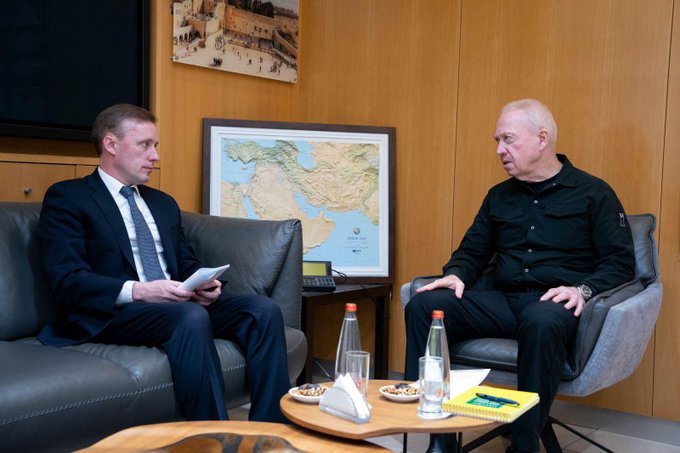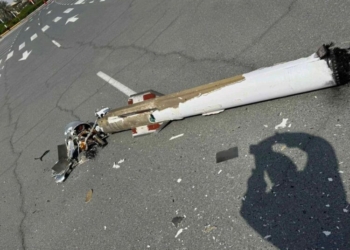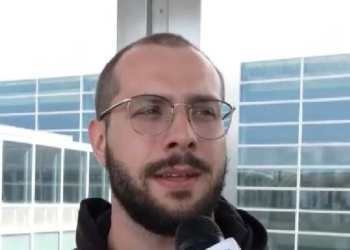Tel Aviv: Israel intends to expand its military operation in Rafah in the south of the Gaza Strip to defeat Hamas and to free the hostages the militant organisation is still holding, despite US concerns, Defence Minister Yoav Gallant said on Monday.
Gallant was speaking during a meeting with US National Security Advisor Jake Sullivan in Tel Aviv, according to Israeli radio. Israeli Chief of the Defence Staff Herzi Halevi also attended the meeting.
Gallant’s office said he had briefed Sullivan “on developments in the war against the Hamas terrorist organisation in Gaza, as well as the various efforts made to ensure the return of 128 hostages held by Hamas.”
Gallant also presented humanitarian aid plans for the population of the Gaza Strip. “This includes significant efforts to evacuate the civilian population in Rafah, facilitating the provision of humanitarian services, and operating in a precise manner to avoid harm to uninvolved civilians,” the statement said.
The tensions on Israel’s border with Lebanon were also discussed. Gallant accused the Lebanese Hezbollah militia of refusing to reach a diplomatic agreement on the withdrawal of its fighters from the border area, risking “a significant escalation.”
Sullivan had earlier repeated that the United States continued to reject a wide scale offensive in the overcrowded city of Rafah in talks with Prime Minister Benjamin Netanyahu and President Isaac Herzog in Jerusalem on Sunday.
According to the White House, Sullivan nevertheless showed understanding for Israeli efforts to locate Hamas leaders in the Gaza Strip.
The White House statement said that Sullivan had reaffirmed “the need for Israel to connect its military operations to a political strategy that can ensure the lasting defeat of Hamas, the release of all the hostages, and a better future for Gaza.”
According to estimates from the United Nations, around 800,000 Palestinians have fled Rafah since the start of the operation two weeks ago. Many of them are refugees from other parts of the Gaza Strip who had sought refuge in its southernmost point.
The White House said that Sullivan had provided information on discussions with Egypt to secure its border with Rafah and to secure the continued flow of humanitarian assistance through the Kerem Shalom crossing from Israel into the southern Gaza Strip.
Kerem Shalom has become key to supplying humanitarian aid following the closure of the Rafah crossing by Israeli forces at the start of the month. Hamas has recently attacked the crossing and Israeli settlements with rockets.
According to media reports, Egypt has indicated it will not coordinate aid transports through Rafah until the Israeli forces withdraw. Talks on reopening the crossing are reported to be continuing.
Following his talks with Sullivan in Jerusalem, Netanyahu posted on the X messaging service that the continuation of the war in Gaza, with an emphasis on Rafah, were discussed, along with “increasing the humanitarian effort in the Strip.”
According to the White House, Sullivan and the Israelis discussed ways of ensuring that humanitarian workers could safely deliver aid to those in need and establish fixed corridors inside Gaza to ensure aid is able to reach all those in need.
Aid has also been arriving by sea at a temporary pier constructed off the Gazan coast by the US Navy.
Reflecting a rise in tensions within the Israeli government, Gallant has demanded the creation of a political alternative to Hamas in the Gaza Strip.
Benny Gantz, a fellow cabinet member, threatened over the weekend to resign if a plan was not in place by June 8 to set up a civilian administration to run the Gaza Strip.
Israeli military operations continued in other parts of the Gaza Strip. The Hamas-controlled health authority reported the deaths on Sunday of at least 24 Palestinians in the Nuseirat refugee camp in the centre of the Gaza Strip.
The Israeli army confirmed that a senior Hamas police officer had been killed in a targeted attack and that another Hamas commander and five activists had been killed in a separate attack in Nuseirat.
Tunnels on the border to Egypt had also been discovered and destroyed.
(IANS)















